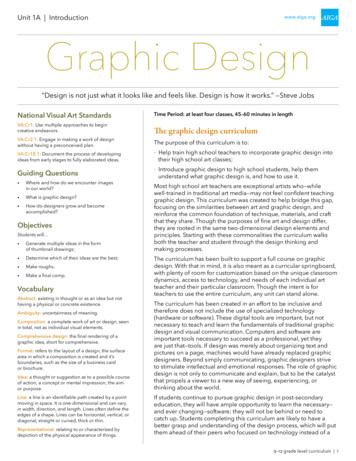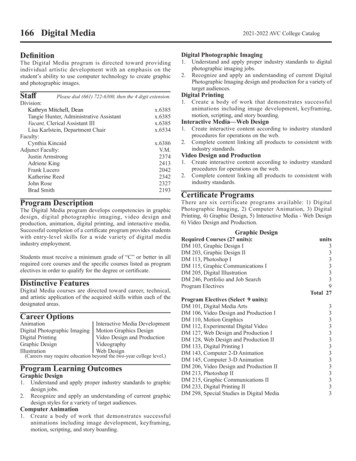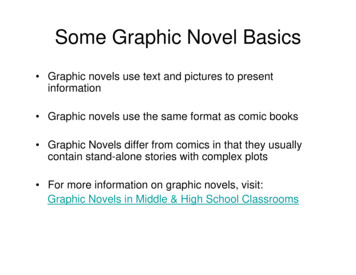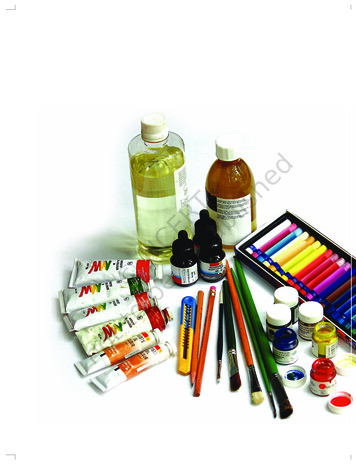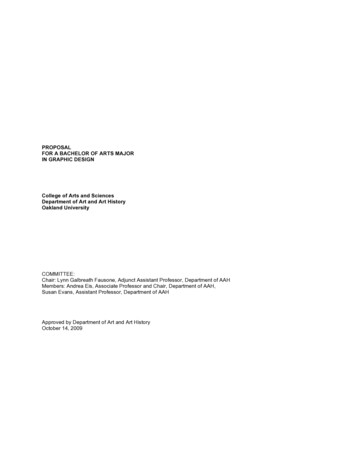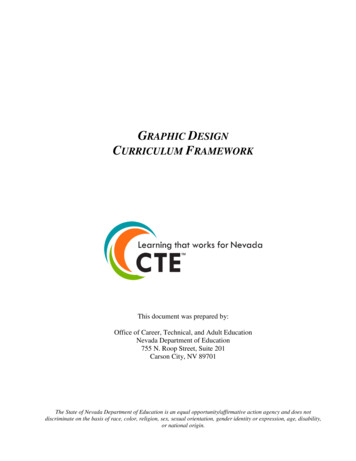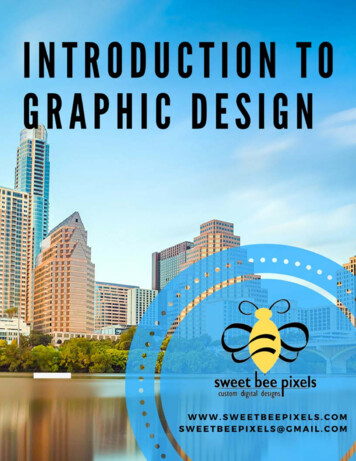
Transcription
Introduction to Graphic DesignCopyright 2016. Sweet Bee Pixels. All rights reserved.www.SweetBeePixels.comNo part of this document or the related files may be reproduced or transmitted in any form, by any means (electronic,photocopying, recording, or otherwise) without the prior written permission of the author, except in the case of briefquotations embodied in reviews, excerpts and images made available for promotional uses, and certain other noncommercialuses permitted by copyright law. The contents of this document and the related files may not be sold or redistributed in anymanner.This published work may contain facts, views, opinions, statements, recommendations, hyperlinks, references, Web sites,advertisements, and other content and links or references to external sources (collectively, “Content”) not owned or controlledby Sweet Bee Pixels. This Content does not necessarily reflect the views, opinions, or recommendations of Sweet Bee Pixels,and any reliance upon such Content is taken at the user’s sole risk. Sweet Bee Pixels and any individual contributors have madereasonable efforts to include accurate, current, “family‐friendly” Content, but we make no warranties or representations as tothe accuracy, safety, or value of Content contained, published, displayed, uploaded, downloaded, or distributed through or aspart of this publication and assumes no liability or responsibility for the content of linked or referenced sources or for errors oromissions in Content. Users are advised that online content and the user’s experience may change during use or over time andare strongly advised to use discernment and wisdom when considering advice and recommendations made in this or any otherpublished work. Sweet Bee Pixels accepts no responsibility for the actions of third parties or for Content provided, uploaded,linked, or posted by third parties.Note to Parents: Remember that Internet site content can change overnight. Please check the sites that you plan to use beforeyour child visits them in the study. Some of the videos in this study are hosted by YouTube and include Google ads that cannotbe completely avoided. These ads can be hidden by clicking on the X in the upper‐right corner of the ad banner.Independent publishing services by Meredith Duke of Sweet Bee Pixels.
TABLE OF CONTENTSLesson 1: Intro to Graphic Design . 1Lesson 2: The Law . 4Lesson 3: The Elements of Design – Pixels . 9Lesson 4: The Elements of Design – Fonts . 14Lesson 5: The Elements of Design – Colors . 19Lesson 6: The Elements of Design – The Audience . 24Lesson 7: The Elements of Design – The Message . 28Lesson 8: Using PicMonkey, Canva, or Gimp . 34Lesson 9: Creating a Logo. 38Lesson 10: Creating a Flyer, Postcard, or Advertisement . 42Lesson 11: Designing a Brochure . 47Lesson 12: Designing a T‐Shirt . 51Lesson 13: Designing a Book Cover . 54Lesson 14: Designing a Product Label . 56Lesson 15: Designing a Poster . 60Lesson 16: The End Game . 63Lesson 17: Final Assignment . 68The Graphic Design Dictionary . 70Resources . 72Answers to Weekly Assignments . 74
Lesson 4The Elements of Design ‐ FontsJust like any other part of a design, fonts can either make or break your creation. The rule ofthumb is to generally use only one or two fonts per design. Too many fonts can make a designtoo busy, hard to read, or just down right confusing. On the other hand, if you use only onefont, your design can be boring. So, don't just think you can slap any old font into a design andmake it sparkle and shine. Fonts change the entire feel and design of the finished product.Before we go too deep into the fonts, let's look at fonts in general. When discussing fonts, thereare a few keywords to keep in mind:o Fonts: specific size and style of a typefaceo Typeface: set of characters with the same designOkay.that's a little confusing. Let's break it up a bit.ROCKWELLis a typeface.ROCKWELLthat is green, italicized and in 16 point bold is a font.A font is a subset of a typeface. o Serif: a typeface with a small stroke at the end of a letter or symbolo Sans Serif: a typeface WITHOUT (aka sans) a small stroke at the end of a letter or symbol14
Make sense now?So, depending on what you are doing (who the audience is and the purpose for the graphic),keep a few of the following tips in mind:o The font should fit the mood or feel of the design (consider the fonts for professionalflyers vs. facebook memes).o Use fonts that are easily readable. Using this font would be really difficult after about twosentences.o Use 1‐2 fonts per design to keep the format clean. It's even okay to mix serif and sansserif fonts in the same design, or bold and cursive fonts.unique funkyo Useorfonts sparingly and for specific purposes (to highlight a word ora title), but not throughout the entire design.15
o Break up fonts using separate text boxes (vary the font size or even the color of thesame typeface).o Make sure you place the text where it can be easily seen in the graphic.If you look at the text in dark purple, it's hard to read. Make your text POP off the page.People need to read what you write. That's the whole point of a graphic, to convey amessage to entice someone to click on a link, open a page, purchase a product, sign apetition, etc. Don't hide the message with a color/font that blends into the background.o Reduce the amount of text in a graphic. White space is very important (more on thatlater).16
o Use fonts from the same family.As you can see in the example above, you can use the same typeface, but separate fontswithin the same typeface to create a good balance. The Rockwell typeface has bold,bold italic, regular, italic, and condensed fonts. Increase the size, change the color, oreven change the font and your ad or design should be fine.These are a few of the tips to keep in mind when using fonts. Keep these in mind and refer backto them as you start creating designs.By the way, here is a list of a few places to get free, royalty free fonts:o http://www.fontsquirrel.com/ (for commercial use)o http://www.1001freefonts.com/ (for personal use only)o http://www.fontspace.com/17
Lesson #4 Assignment:Define font and typeface.What is the difference between serif and sans serif?List 5 of the font guidelines mentioned in this lesson.Using the font links provided, or the ones on your computer, select 2 different fonts to pairtogether. Create your own phrases and test to see which fonts pair well together. Print andsave in your Graphic Design notebook.18
The Elements of Design ‐ Fonts Just like any other part of a design, fonts can either make or break your creation. The rule of thumb is to generally use only one or two fonts per design. Too many fonts can make a design too busy, hard to read, or just down right confusing.
